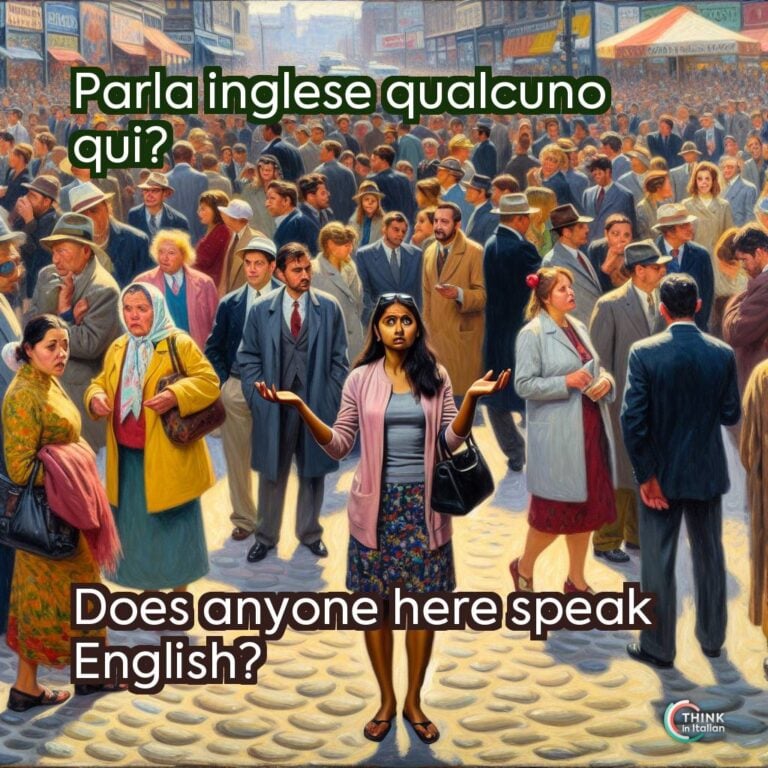Can you Live in Italy Without Speaking Italian?
As simple as it is, yes! Moving to Italy without knowing Italian is entirely possible, and thousands of expats do it successfully every year, but it depends on where.
Italy’s main cities like Rome, Milan, and Florence have big international communities and areas where English is commonly spoken, especially among youths, and people who work in the service industry or tourism.
However, if you speak no Italian at all, you might face some challenges when it comes to administrative tasks, social interactions, and daily errands in less touristy areas.
Italian bureaucracy is known for its complexity, so preparing for potential language obstacles can make a difference in how easily you settle in.
In this article I will tell you what you need to know about moving to Italy without Italian, including tips for managing daily life, understanding local culture, and using resources to make the transition easier.
Moreover, I will give you insights into how learning even a little Italian can enrich your experience, helping you connect more deeply with the culture and feel more at home in Italy.
Daily Life Challenges Without Italian
Living in big Cities vs Small Cities
As I mentioned already, if you’re settling in big cities like Rome, Milan, or Florence, you’ll find more English speakers, especially among younger Italians and in tourist areas.
However, outside these zones and in smaller towns, English fluency diminishes significantly. For everyday tasks like grocery shopping, ordering food, or asking for directions, knowing basic Italian phrases can make a world of difference.
Learn at least basic Italian sentences like:
Quanto costa questo?
How much does this cost?
Dov’è il bagno?
Where is the bathroom?
While you can get by without Italian in some areas, in more rural or suburban settings, knowing essential phrases can smoothen your day-to-day experience.
Navigating Italian Bureaucracy
Italian bureaucracy has a reputation for being slow and complex, and I, as an Italian who was born and raised in Italy, I can confirm.
If you’re planning a longer stay, you’ll likely encounter administrative tasks like applying for a residency permit, setting up utilities, or opening a bank account.
In these cases, speaking Italian can be a tremendous help, as many government offices may not have English-speaking staff. If you’re nervous about handling this on your own, consider hiring a relocation consultant or an English-speaking lawyer.
Social Life and Connecting With Locals
Italians are known for their friendliness and openness. In cities, I am sure you will meet Italians who are interested in practicing their English with you, especially younger people who have worked or studied in international environments.
However, learning a few Italian phrases can help you build more genuine connections and show that you’re making an effort to integrate.
Learn the most common words, especially greetings, like buongiorno (good morning) or grazie (thank you). You will show respect for the local culture and your interactions will feel warmer.
Italy has a thriving expat community, especially in larger cities, so if you’re feeling isolated, consider joining language exchange meetups or expat groups to meet both Italians and fellow expats.
Learn Italian in Italy
Immersion and Local Schools
So we established that it is possible to live in Italy without Italian. However, learning the language can profoundly improve your experience.
If you’re wondering “why should I learn Italian?“, I could list you plenty of reasons, but since your goal is living in Italy, having the possibility to deeply connect with the culture should be enough already.
Imagine being able to understand idiomatic expressions, regional dialects, or the Italian humor. This will help you appreciate the diversity within Italian culture.
Consider living with Italian roommates, joining community clubs to practice conversational Italian, or consuming Italian media – from podcasts to newspapers – to further strengthen your comprehension and familiarity with Italian slang.
In many Italian cities, language schools offer courses tailored to foreigners. These courses often focus on practical language skills, helping you handle real-life situations more comfortably.
The best part of enrolling in these classes is that it can introduce you to other expats in similar situations, helping you establish a support network.
Embracing the Italian Culture
Language is only one part of Italian culture. Italians are expressive communicators who often use gestures and intonation to convey meaning.
Learning a few Italian gestures and adopting a bit of expressive intonation can help you blend in even if you’re still learning the language.
Understanding cultural norms and customs can also help you integrate. For instance, Italians take pride in regional traditions, from local cuisines to dialects. Meal times vary across the country, and participating in these customs can help you feel like a local.
Is Learning Italian Worth it?
Moving to Italy without Italian is absolutely possible, especially if you stick to urban areas. However, investing time in learning the language opens doors to deeper cultural experiences, warmer connections, and a more enriching daily life.
Even knowing just a few phrases shows respect and a willingness to adapt, which Italians appreciate. If you’re visiting Italy for a short stay, consider learning Italian for travel. If you’re making a permanent move, focus on your goals.
I promise it will enhance your experience, foster meaningful relationships, and allow you to engage with Italian culture on a personal level.
So, buona fortuna (good luck) on your Italian journey!








